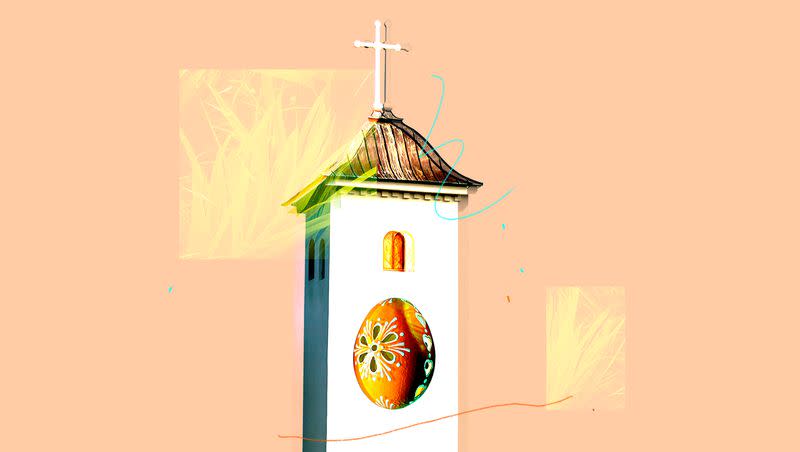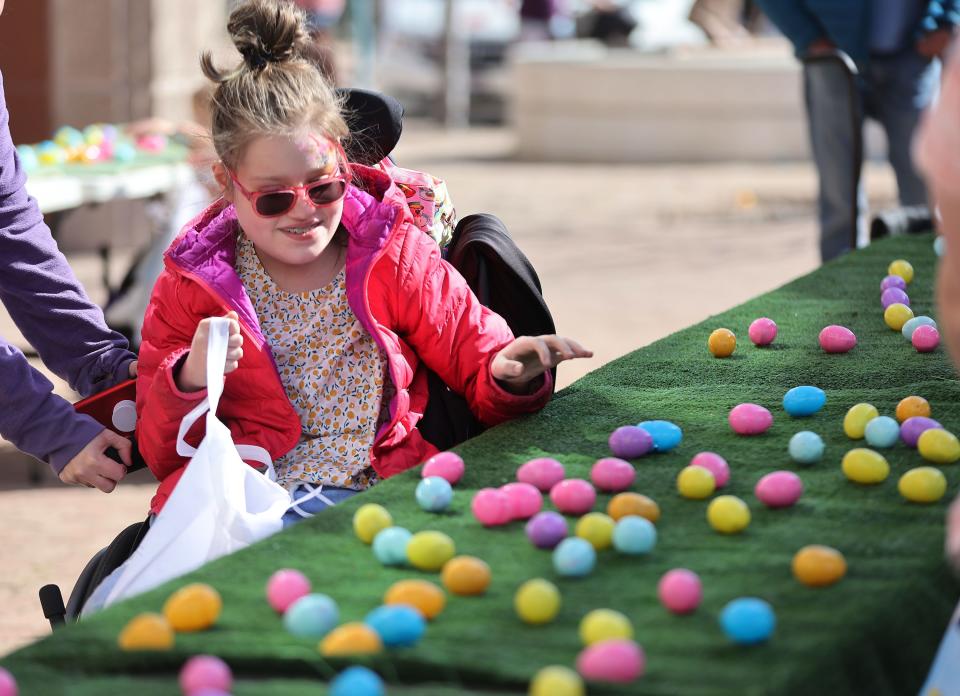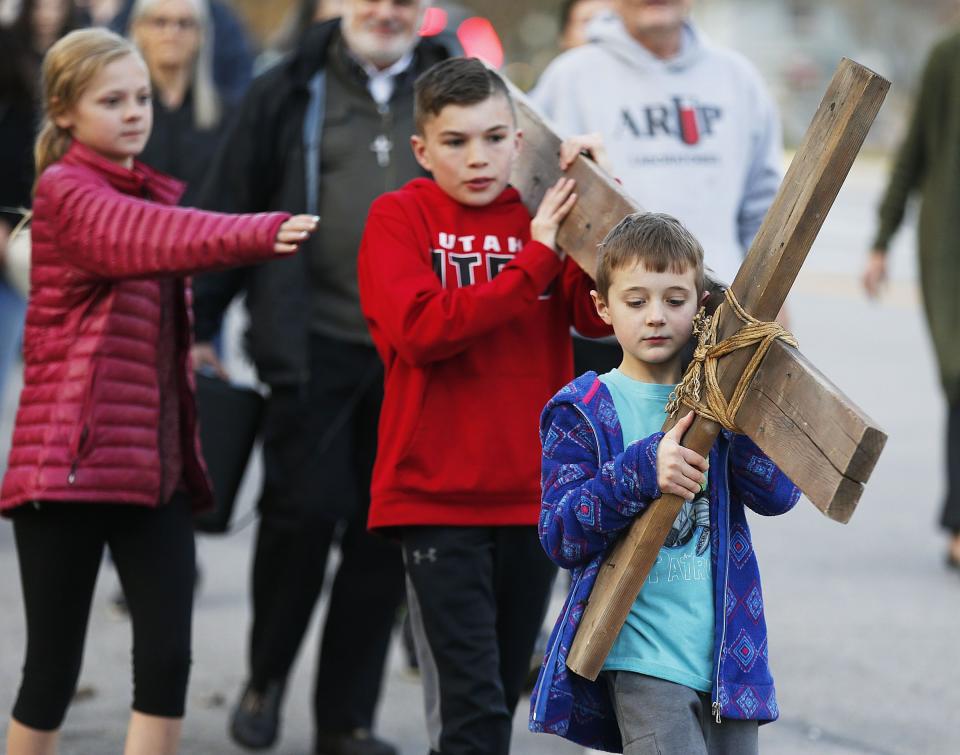How to talk to your kids about Easter

The Rev. Ryan Burge has spent a lot of time in recent years thinking about the challenges Easter poses to Christian parents.
Sure, they, like other parents, can enjoy stealing some of their kids’ Easter candy or arranging cute family photo shoots. But they have to consider whether that candy or those photos or any number of other secular Easter traditions will distract from the religious significance of the day.
Oh, and they also have to explain the religious significance of the day, which can involve talking about complicated and potentially scary concepts like betrayal, crucifixion and resurrection.
“You want to give your kids a religious foundation, but also let them be kids. I don’t know how you square it all,” said the Rev. Burge, pastor of First Baptist Church in Mount Vernon, Illinois.
The Rev. Burge, who has an 8-year-old and an 11-year-old, has essentially decided that you can’t. So he’s stopped focusing on finding the perfect approach to Easter and instead started focusing on feeling less guilty when some part of the celebration goes awry.
Related
Similarly, Kyla Rodriguez, the kids’ ministry coordinator for St. Peter’s Lutheran Church in Columbus, Indiana, goes bold with her Easter planning rather than dwelling on potential or actual awkward moments.
She takes her three children — a kindergartener, preschooler and 18-month-old — to a range of religious and secular events each spring, while regularly reminding them of what Christians believe.
“I spend a lot of time teaching the basic framework of what happened,” she said.
In general, Rodriguez, the Rev. Burge and other faith leaders recommend that Christian parents embrace the joy of the Easter season instead of the stress.
The Easter story and surrounding events can feel like a big, complicated puzzle that you have to teach your kids to put together, but they don’t have to learn to do that all at once, Rodriguez said.
Here are other tips for making Easter religiously significant and stress-free for your family:
Follow your heart, not the crowd
At Easter, as at Christmas, it’s hard to avoid the pressure to get swept up in popular trends, whether that be buying brand-new, matching outfits for Easter worship or drinking Peeps-flavored Pepsi.
But the problem with adopting new traditions on a whim is that once you start, it can be very hard to stop, the Rev. Burge said. You have to think about whether that activity will serve your family in the long term.
“You’ve got to be really careful about what you start doing,” he said.
During his talk at last week’s general conference for The Church of Jesus Christ of Latter-day Saints, Elder Gary E. Stevenson of the Quorum of the Twelve Apostles encouraged families to look for “Christ-centered Easter traditions.”
“How do we model the teaching and celebration of the Resurrection of Jesus Christ, the Easter story, with the same balance, fullness, and rich religious tradition of the birth of Jesus Christ, the Christmas story? It seems we are all trying,” he said. “I observe a growing effort among Latter-day Saints toward a more Christ-centered Easter. This includes a greater and more thoughtful recognition of Palm Sunday and Good Friday as practiced by some of our Christian cousins. We might also adopt appropriate Christ-centered Easter traditions found in the cultures and practices of countries worldwide.”

Don’t let the Easter bunny steal the show
In the not-too-distant past, it was rare for churches to host their own Easter egg hunts, Burge said. It was also less common for Christians to embrace secular Easter traditions, like Easter bunny photo shoots.
Now, those activities are the norm, which is why few religious families try to avoid them. Rodriguez, for example, brings her kids to all sorts of fun Easter events, since the holiday is meant to be a celebration.
“Easter is an amazing time of celebration for the church. ... I love having the opportunity to lean into that fun,” she said.
Where problems arise, Rodriguez added, is when families focus on secular traditions at the expense of religious ones. In other words, parents have to strike a balance between sharing the biblical Easter story and sharing stories about the Easter bunny.
“If your family is only attending Easter egg hunts and seeing the Easter bunny, your kids won’t feel a religious connection,” she said.
Similarly, the Rev. Burge said you don’t have to banish chocolate bunnies or Easter eggs from your house to ensure that your kids understand the spiritual significance of Easter. But you do have to talk early and often about why Easter matters to Christians.
“You want to make sure you’re still centering the important part and talking about Jesus and the resurrection and all those things,” he said.
Prepare your kids for worship (and then prepare to field questions)
Since Rodriguez and her husband both work at a church, they make Holy Week a family affair.
The kids come along for not only the kid-focused events, like a community Easter egg hunt, but also the more serious gatherings, such as the Good Friday worship service, which focuses on Jesus’ death on the cross.
Before each event, Rodriguez tells her kids what to expect, in hopes that she can help them feel comfortable. Before Good Friday worship, for example, she explains that the sanctuary will be darker than normal and that people may seem sad.
“I let them know that church will be extra quiet,” she said.
After each event, Rodriguez continues the conversation about what it meant, giving her kids a chance to ask questions.
“Oftentimes, kids are really great discussion leaders and we don’t realize it. ... I follow their lead,” she said.

Focus on the themes of the Easter story, rather than the details
The Easter story may have a happy ending, but it can be scary or confusing for young kids.
That’s why the Rev. Burge focuses on telling children about the lessons we can draw from Jesus’ sacrifice, rather than on the specific details of the crucifixion, like what it would feel like to be nailed to a cross.
“I don’t get into the ... brutality. I don’t think that works with younger kids,” he said.
Rodriguez favors a similar approach. Her goal is to “plant seeds” and “lay foundations” while her kids are young, not to get them to grasp every piece of the Easter story all at once.
“I try to drip the information and follow their lead, not firehose them,” she said.
As Lifeway, a Christian publishing company, puts it, “It’s important for children to understand certain foundational truths before they hear the Easter story.”
What matters is for young people to understand the broad strokes of the biblical message, like the beauty and power of doing something you may not want to do on behalf of someone else, the Rev. Burge said.
“I try to make it as simple as possible,” he said. “Talking about what the Easter story means is more important than talking about the nitty gritty details.”
Don’t beat yourself up
Easter is an important religious holiday, so it’s good to spend time thinking about how your family celebrates it, the Rev. Burge said.
But if things don’t play out the way you imagined they would, you have to try to let go of your stress and just roll with it, he added.
“Most parents end up feeling guilty all the time,” the Rev. Burge said. “But a lot of these battles are impossible to win.”
The key is to be careful about where you’re focusing your attention and to look for special moments instead of moments that cause you pain.
Rodriguez adopts this outlook as she tries to get her kids to memorize a short Bible verse each year in the lead-up to Easter. Rather than worry about mispronounced words or the tedious process of memorization, she thinks about how wonderful it is to hear them share a bit of the Easter story that is so central to her faith.
“It’s priceless to hear them repeat good news of the gospel with their own little voices,” she said.

